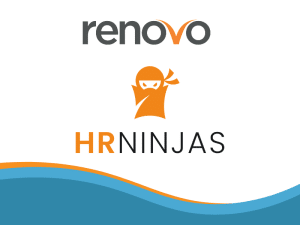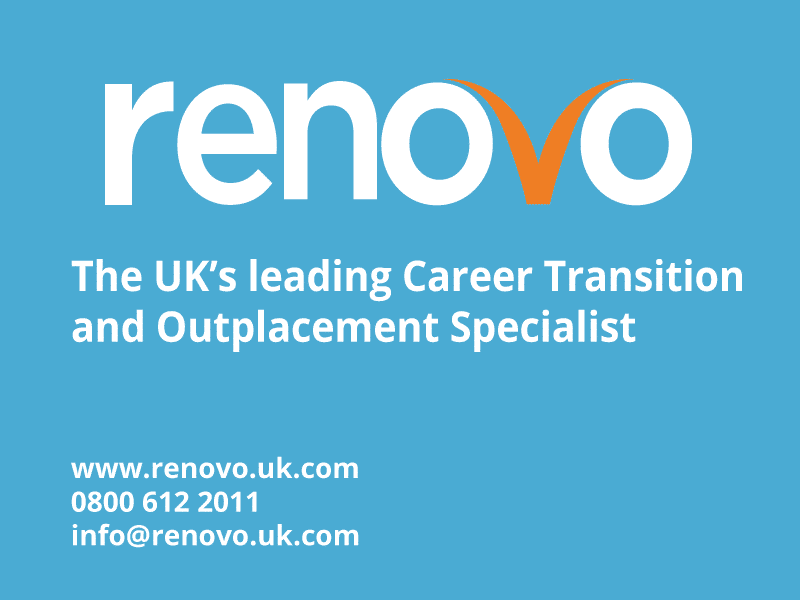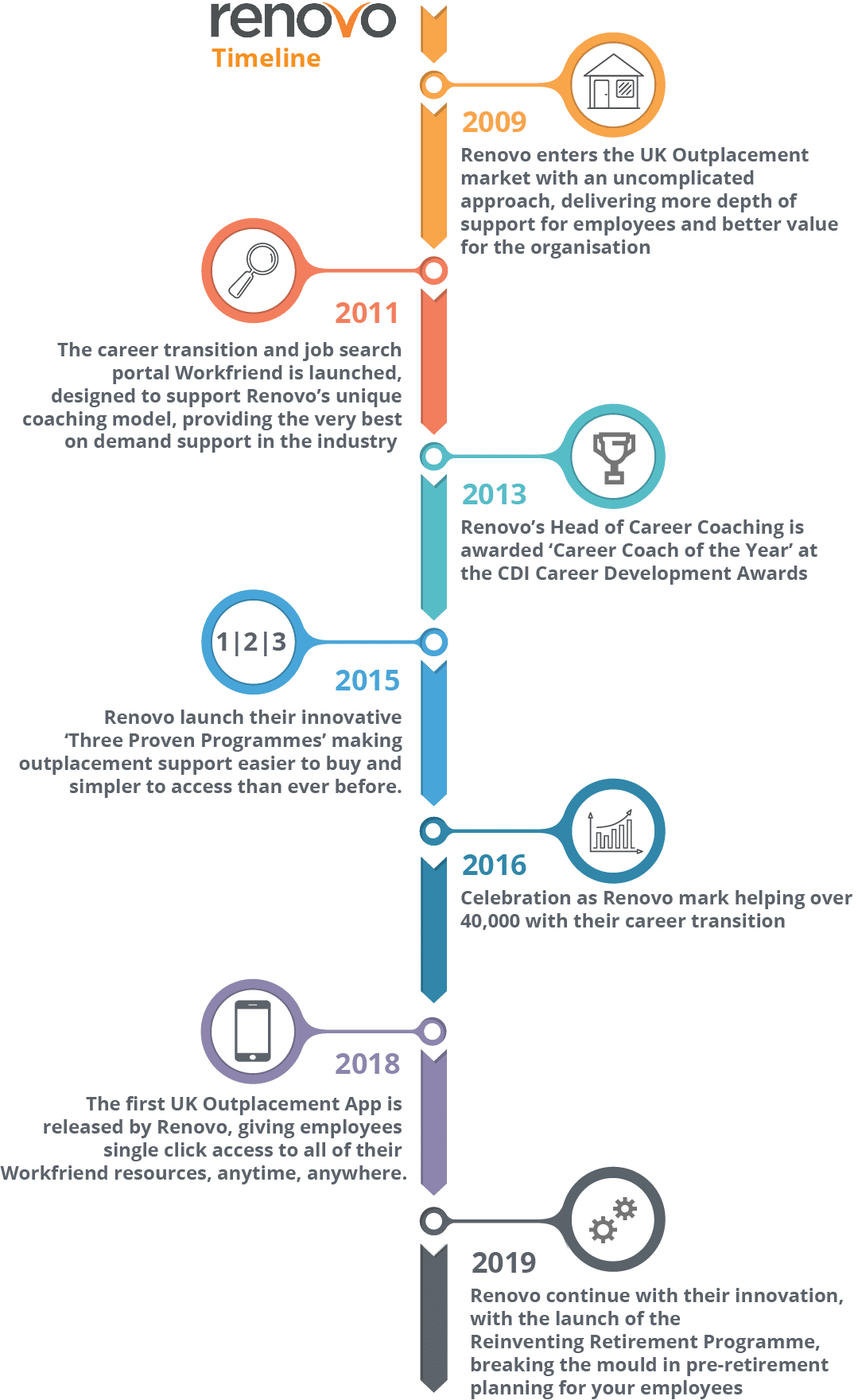The Challenges Ahead: Job Search Predictions for 2025
 With 2024 now in the rear-view mirror, Renovo’s Luke Mersey sat down for a fascinating conversation with Head of Career Coaching, Emma Louise O’Brien, to take a look back at the challenges posed by the job market over the past 12 months and to take a look ahead to what the future might hold for job seekers in 2025. Is optimism on the horizon or will difficulties persist?
With 2024 now in the rear-view mirror, Renovo’s Luke Mersey sat down for a fascinating conversation with Head of Career Coaching, Emma Louise O’Brien, to take a look back at the challenges posed by the job market over the past 12 months and to take a look ahead to what the future might hold for job seekers in 2025. Is optimism on the horizon or will difficulties persist?
Emma Louise, what noticeable job market trends have you seen across 2024?
“It was a very challenging job market in 2024 for a variety of reasons. Firstly, the unemployment rate in the UK rose to 4.3% in the first part of the year. At the same time, we’ve seen a marked decline in job vacancies being advertised so in short there have been more job seekers looking for work but with fewer opportunities to apply for.
We’ve also seen more companies insist on a return-to-work policy. Whereas previously, it was easier for jobseekers to apply for roles outside of their immediate geographical location, that’s no longer the case. At the same time job seekers at all levels are experiencing more layers in the recruitment process, more notably at an executive level. In the past, the turnaround time from application to placement was often fairly swift, but the process is typically taking a lot longer now, particularly for those who are more senior where the overall process can take up to 6 months.
The election also proved a challenge as many organisations put their recruitment processes completely on hold until the new government was elected. This coincided with the summer period which is traditionally when we find the recruitment market slows down.
When you put all these factors together it made 2024 a more slow-moving job market than usual”.
As Head of Career Coaching at Renovo, what key topics have you been supporting participants with across 2024?
“We’ve spent a lot of time as a Coaching team, educating participants in order to help them better understand the modern job market and set some realistic expectations for themselves.
AI is a good example. Over the last few years, we’ve seen a rise in organisations using Applicant Tracking Systems (ATS) as a key part of their recruitment strategy to help them shortlist candidates. As such ensuring that employees are aware of those processes and that they understand how to adapt their CV so that it’s ATS compliant and makes a candidate shortlist, is very important.
Another is online visibility. More and more recruiters and organisations are using LinkedIn to find candidates, so it’s important that a job seeker understands the importance of LinkedIn and how it is being used, but also that they have a LinkedIn profile that is optimised, so that they are being found in candidate searches. At the same time, we’ve also seen a rise in “social recruiting” where professionals are posting vacancies via their own LinkedIn accounts on behalf of their organisations, which is more cost effective as it removes advertising costs as well as it reaching their personal networks."
How is this different from what you’ve supported with in the past?
“A lot of people are still quite reluctant to use their network to any great extent or to share the fact that they’re actively looking for work, however, with the rise of social media and the shift in the way we communicate with each other, individuals are much more visible online so the idea of ‘light touch networking’ is important, albeit very different to what we’ve seen previously. Just liking and commenting on posts online can increase visibility and opportunities these days.
As you can imagine some individuals are more tech savvy than others and are using the likes of ChatGPT or Microsoft CoPilot to generate ideas and create content, but they’re also thinking that they can use these tools for writing their CV and cover letters as well, so we’re educating job seekers as to how to use it with caution. We’ve definitely seen cases where recruiters are receiving duplicated applications and the same cover letter from multiple candidates, so it's important that employees understand that if they are using AI, they do so appropriately or else it can potentially have a detrimental impact upon their applications.
Finally, managing expectations as to how time consuming the process can be now is also more important than it was before. More stakeholders are involved in the recruitment process now and where roles may have been subject to 1 or 2 stages of interview in the past, there are now often 2 or 3 to have to handle”.
As we look ahead to 2025, what new workforce and job market trends do you potentially anticipate?
“There are a number of external factors to consider in 2025 such as the government’s plan to increase the NI contributions for employers, which will have an impact on the job market as it’ll mean headcount reduction and organisations will probably choose not to hire, so job vacancy numbers will also drop. At the same time, competition for roles will also be higher as more people apply for the same roles. As such it’s hard not to see it continuing to be a very challenging job market.
With that in mind, ensuring that jobseekers are considering other opportunities which may arise such as interim or contract roles, could be key. We started to see an increase in this in 2024 as organisations started hiring for special projects or recruiting consultants to work in certain business areas, so applicants may need to start feeling more comfortable about considering this sort of career change.
Similarly, at the executive level, some organisations may be more reluctant to hire on a more permanent basis as well, so we might see more ‘micro consulting’ opportunities where individuals go into an organisation to provide consultancy on a more modest scale or an increase in ‘fractional working’ where an organisation may recruit a CFO or CEO on a part time basis as opposed to on a traditional 5 days a week one.
Ultimately, it’s important for all job seekers, if possible, to start feeling more comfortable working in a different way and in a faster-paced world. Many people think of interim roles as being short term and therefore higher risk, but again it’s about educating them and helping them to keep their options open.
The recently published Get Britain Working White Paper also suggests that the government will be looking to increase opportunities for jobseekers next year. This includes the ‘Youth Guarantee’ to ensure that every young person has access to apprenticeships, training, or job opportunities, as well as the fact that local authorities and mayors will be given the resources to create tailored employment plans for their regions, to promote job growth.”
Lastly, what do you anticipate the key challenges will be for job seekers in 2025 and what will they need to focus their job search efforts on?
“Upskilling in terms of technology is going to be crucial; ensuring that you have an awareness of how AI can impact the way you write your CV or how to approach ‘one-way interviews’ for example, where applicants (typically at the first stage) are given a few minutes to record themselves answering a series of pre-selected questions, which are then reviewed by the organisation in isolation.
In terms of softer skills, the importance of networking will still be huge - engaging with LinkedIn effectively, being visible and willing to share on social channels will have a key part to play in the career transition journey. Even at the Executive level, we’re still seeing that many senior leaders haven’t invested in their network as much as they perhaps could have done, so we’re making sure that everyone is thinking about this more strategically even if they’re not actively looking for work.
It’s also going to be important for job seekers to start considering industries where there’s likely to be growth, even if they’ve not thought about approaching those sectors before. As an example, it’s highly likely that we’re going to see a further increase in green jobs, particularly with the government’s promise to combat climate change and the commitment to net zero carbon emissions by 2050. This will likely see more organisations than ever creating opportunities through their own commitments to things like Corporate and Social Responsibility (CSR), or sustainability. This shift in mindset could lead to a focus on recruiting employees with some of those ‘green’ skills, so employees may want to have a think about their own experiences and what they have to offer”.
 Renovo has helped hundreds of leading organisations and thousands of people impacted by redundancy this year. With workforce change likely to increase in 2025 and with an ever-tightening job market, that support has never been needed more. So, if you’re looking at how you might want to support your people to move on quickly and successfully post redundancy next year, and you want to put them in safe hands, then we thought this might be of interest.
Renovo has helped hundreds of leading organisations and thousands of people impacted by redundancy this year. With workforce change likely to increase in 2025 and with an ever-tightening job market, that support has never been needed more. So, if you’re looking at how you might want to support your people to move on quickly and successfully post redundancy next year, and you want to put them in safe hands, then we thought this might be of interest. We’re delighted to announce that as of May this year, Renovo is officially a proud partner of HR Ninjas.
We’re delighted to announce that as of May this year, Renovo is officially a proud partner of HR Ninjas. Renovo, one of the UK’s leading specialist providers of career transition support has been acquired by
Renovo, one of the UK’s leading specialist providers of career transition support has been acquired by  As a specialist career transition provider, we recognise the increased uncertainty and challenge that Covid-19 is likely to cause the individuals we are currently supporting. In response, we have made the decision to extend the duration of all live outplacement programmes with immediate effect.
As a specialist career transition provider, we recognise the increased uncertainty and challenge that Covid-19 is likely to cause the individuals we are currently supporting. In response, we have made the decision to extend the duration of all live outplacement programmes with immediate effect. We’re celebrating our 10th anniversary! It’s been a fantastic journey and our great team, along with the support of our clients has meant that today we’re the UK’s leading specialist provider of outplacement support.
We’re celebrating our 10th anniversary! It’s been a fantastic journey and our great team, along with the support of our clients has meant that today we’re the UK’s leading specialist provider of outplacement support.
 We’re in congratulatory mode here at Renovo as this month sees our Head of Career Coaching Emma Louise O’Brien celebrate 9 years with the business! We asked Emma Louise to share her thoughts on how the business has changed over those years, and questioned what she enjoys about her important role at Renovo. Here’s what she said:
We’re in congratulatory mode here at Renovo as this month sees our Head of Career Coaching Emma Louise O’Brien celebrate 9 years with the business! We asked Emma Louise to share her thoughts on how the business has changed over those years, and questioned what she enjoys about her important role at Renovo. Here’s what she said: 2019 is fast approaching and it promises to be a year of intense economic change. With Brexit drawing ever closer, UK businesses are still unclear as to the impact it will have on them.
2019 is fast approaching and it promises to be a year of intense economic change. With Brexit drawing ever closer, UK businesses are still unclear as to the impact it will have on them. Due to a period of further growth, leading outplacement provider Renovo, is looking to expand its commercial team in London ready for the opening of a new City Office which has been scheduled for 2019. The move is in response to the rapidly growing demand for our contemporary career transition services which has provided a clear opportunity to significantly increase market share across the capital.
Due to a period of further growth, leading outplacement provider Renovo, is looking to expand its commercial team in London ready for the opening of a new City Office which has been scheduled for 2019. The move is in response to the rapidly growing demand for our contemporary career transition services which has provided a clear opportunity to significantly increase market share across the capital.